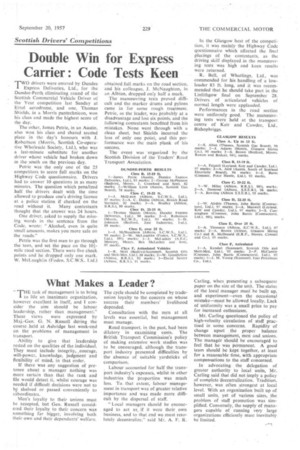What Makes a Leader?
Page 63

If you've noticed an error in this article please click here to report it so we can fix it.
THE task of management is to bring to life an inanimate organization, however excellent in itself, and I consider the aim should be labour leadership, rather than management." These views were expressed by Maj.-Gen. G. N. Russell during the course .held at Ashridge last week-end on the problems of management in transport.
Ability to give that leadership rested on the qualities of the individual. They must include integrity, ,courage. will-power, knowledge, judgment and flexibility of mind, in that order.
If there was any suggestion of pretence about a manager nothing was more certain than that the rank and file would detect it, whilst courage was needed if difficult decisions were not to be shelved or passed conveniently to subordinates.
Men's loyalty to their unions must be accepted, but Gen. Russell considered their loyalty to their concern was something far bigger, involving both their own and their dependants' welfare.
The cycle should be completed by tradeunion loyalty to the concern on whose success their members' livelihood depended.
Consultation with the men at all levels was essential, but management must manage.
Road transport, in the past, had been dilatory in examining costs. The British Transport Commission's policy of making extensive work studies was to be encouraged, although the transport industry presented difficulties by the. absence of suitable yardsticks of comparison.
Labour accounted for half the transport industry's expenses, whilst in other industries the proportion was much less. To that extent, -labour management in transport was of greater relative importance and was made more difficult by the dispersal of staff.
" Local managers should be encouraged to act as, if it were their own business, and to that end we must resolutely decentralize," said Mr. A. F. R.
Carling, when presenting a subsequent paper on the size of the unit. The status of the local manager must be built up, and experiment—even the occasional mistake—must be allowed locally. Lack of uniformity was a small price to pay for increased enthusiasm.
Mr. Carling questioned the policy of high-velocity circulation of staff practised in some concerns. Rapidity of change upset the proper balance between management, men and unions. The manager should be encouraged to feel that he was permanent. A good team should be kept together, at least for a reasonable time, with appropriate compensations to the staff concerned.
In advocating the delegation of greater authority to local units, Mr. Carling said that did not imply a policy of complete 'decentralization. Tradition. however, was often strongest at local level. With an organization built up of small units, yet of various sizes, the problem of staff promotion was simplified. Conversely, the supply of managers capable of running very large organizations efficiently must inevitably be limited.
















































































































